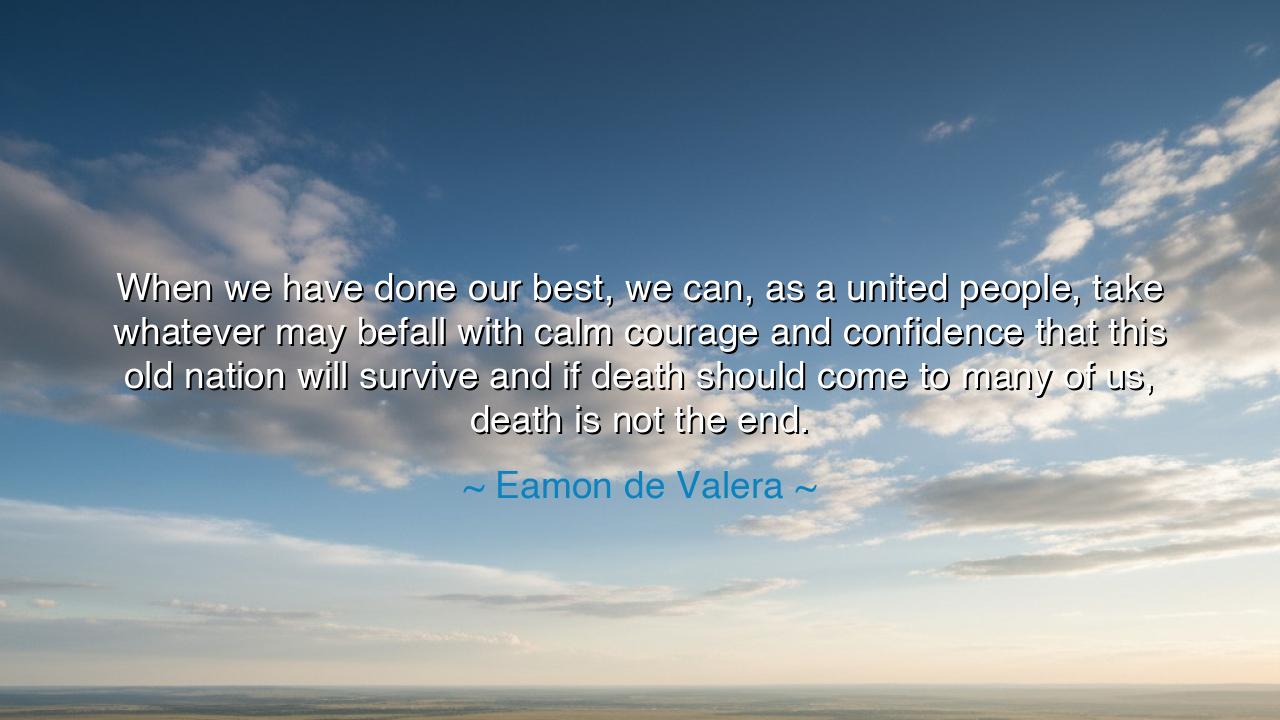
When we have done our best, we can, as a united people, take
When we have done our best, we can, as a united people, take whatever may befall with calm courage and confidence that this old nation will survive and if death should come to many of us, death is not the end.






"When we have done our best, we can, as a united people, take whatever may befall with calm courage and confidence that this old nation will survive and if death should come to many of us, death is not the end." Thus spoke Éamon de Valera, the statesman and freedom fighter who carried Ireland’s soul through rebellion, struggle, and renewal. His words are both a call to valor and a hymn of faith. In them lives the spirit of a nation long acquainted with suffering yet unbroken in hope—a people who found strength not in conquest, but in endurance. De Valera’s message is not only to his countrymen, but to all who face trial: that when we have given our best, we must meet fate with courage, trusting that even in loss there is victory, and even in death, there is continuance.
The origin of this quote lies in the dark days of the Second World War, when Ireland—newly independent and still fragile—stood neutral amid the chaos that engulfed Europe. De Valera, as leader of the Irish people, spoke to inspire resolve, unity, and faith. He reminded his countrymen that though they stood apart from the war’s armies, they too were being tested. “When we have done our best,” he said, meaning when each soul has fulfilled their duty in honesty and courage, then whatever follows—be it peace or loss—must be faced with calm dignity. In those words, he transformed fear into faith, despair into defiance, and mortality into meaning.
At its heart, this quote speaks to the ancient virtue of acceptance—not the weak surrender to fate, but the strong serenity of one who has fulfilled his purpose. De Valera’s “calm courage” is the courage of those who do not flinch before hardship, because they have already done all that can be done. It is the courage of warriors after battle, of builders after labor, of souls who can stand before history and say, “I have given my all.” This is a courage deeper than pride, for it springs not from arrogance, but from integrity—the knowledge that one’s conscience is clear, and one’s duty complete.
Throughout history, great nations and noble hearts have lived by this same principle. When Leonidas and his three hundred Spartans held the pass at Thermopylae, they knew death awaited them. Yet they fought not for victory, but for the honor of having done their best. When Abraham Lincoln, amid civil war, declared that the Union must endure “with malice toward none, with charity for all,” he too echoed this truth—that when duty is done, even sorrow can be borne with peace. And in Ireland’s own story, from the rebels of 1916 to the peacemakers of later years, the same spirit endured: the belief that no sacrifice is wasted when offered for love of one’s people and one’s principles.
De Valera’s words also remind us of the eternal nature of the soul. “If death should come to many of us,” he said, “death is not the end.” In these words, we hear not mere politics, but the voice of faith—the ancient belief that the spirit transcends the grave, and that the ideals for which men die live on in those who remember. This faith, born of centuries of Irish endurance, turns death itself into a servant of life. The body may perish, but courage, duty, and love are immortal. They move like unseen rivers beneath the soil, nourishing the generations yet to come.
In every life, there comes a time when one must face the unknown. The storms of the world—war, loss, injustice, or personal trial—will always come. But de Valera’s teaching endures: do your best, and fear not what follows. When you have acted with honor, when you have kept faith with those who depend on you, when you have served truth above comfort—then no outcome can truly defeat you. Even suffering becomes sanctified, and death itself loses its sting, for you have already conquered the only true enemy: despair.
So, my children of tomorrow, remember this: be steadfast. Strive always to do your best, not for glory, but for goodness. Meet hardship not with panic, but with calm courage. Hold fast to unity, for no people divided can endure the trials of fate. And if loss should come, if the night seems endless, remember de Valera’s wisdom—that death is not the end, and that all who live with honor, faith, and duty are already eternal.
For nations and souls alike, the measure of greatness lies not in the absence of struggle, but in the spirit with which one meets it. Do your best, hold your head high, and trust that the work of your heart—though unseen—will help the world to survive. And like that “old nation” of de Valera’s faith, you too shall endure, unbroken through the ages, guided by courage, sustained by hope, and blessed with the quiet peace that comes when one has truly done one’s best.






AAdministratorAdministrator
Welcome, honored guests. Please leave a comment, we will respond soon